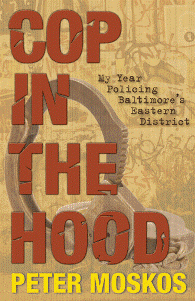Campus drug reform activists from around the country -- and beyond -- gathered last weekend in College Park, Maryland, for SSDP's 10th annual international conference. They lobbied, they listened, they learned, and now they're heading back home well-energized to apply the lessons they learned.
Harvard-trained sociologist Peter Moskos was interested in police socialization, so he joined the Baltimore PD and hit the mean streets of the city's Eastern District for more than a year as a uniformed officer. The book he wrote based on his experiences is an illuminating gem.
Earlier this month we wrote seeking support for StoptheDrugWar.org (DRCNet)'s lobbying programs, to help us lobby the Obama administration and Congress on causes near and dear to the hearts of drug reformers with which the President-Elect has said he agrees. We also seek tax deductible donations to our educational programs, especially our web site, on which readership continues to go up and up.
An Indiana prosecutor gets slapped again over shady asset forfeiture practices, a Texas trooper gets caught with the coke, and so does a North Carolina cop.
As his term comes to a close, President George Bush has begun to exercise his pardon power, and a handful of drug offenders have benefited.
The California Supreme Court has made it more difficult for people to qualify as medical marijuana caregivers. That should push patients toward co-op and collective dispensaries -- except in areas where there aren't any.
Dutch pot politics is heating up again, with mayors looking for a way to solve the "backdoor problem" with their coffee shops, and some in the conservative government wanting to see the coffee shops just go away.
Events and quotes of note from this week's drug policy events of years past.
Buoyed by this month's election results and jazzed by the prospects for change with a new administration in Washington, some 450 student activists converged on the University of Maryland campus in College Park last weekend to celebrate the 10th anniversary of Students for Sensible Drug Policy (SSDP) at the group's annual international conference.

first evening gathering (photo courtesy DrugWarRant.com)
Hosted by University of Maryland SSDP, traditionally one of the national group's staunchest chapters, the conference saw students come from across the nation and at least two foreign countries for three days of education, training in effective activism, and hands-on lobbying on Capitol Hill. Among the attendees were representatives of
Canadian SSDP, buoyed by their own national conference, the organization's second, attended by 250 people earlier this month.
For both SSDP veterans and newcomers alike, the conference provided opportunities for networking, inspiration, and education. For some of the younger attendees, it was an eye-opener.
"I didn't realize how many people were involved in this," said SSDP national office intern Ericha Richards, a freshman at American University. "It's exciting!"
Jimmy Devine of Franklin Pierce University in New Hampshire has been attending for several years, but still found plenty to get excited about. "It's always good to come to national, to see what the other chapters have been up to, and to meet old friends," he said. "And we're always looking for new ideas to take back with us."
On Friday, led by Marijuana Policy Project (MPP) lobbyist Aaron Houston, the students spent the morning polishing up on lobbying basics, then visited with representatives or their staffers to push for reductions in the crack/powder cocaine sentencing disparity. Students reported mixed results, but that's no surprise, and even with representatives on the wrong side of the issues, lobbying is part of changing minds -- and votes.
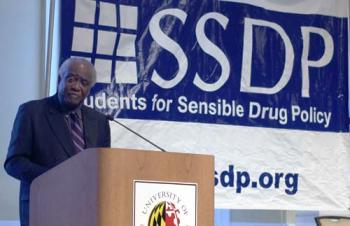
Rep. Danny Davis (photo courtesy DrugWarRant.com)
On Saturday and Sunday, students gathered at the University of Maryland student union for two days of panels and training in activism. Saturday morning, they heard from movement leaders, who described the chances of drug reform at the federal level in coming years with varying degrees of optimism. With the Democratic sweep of the presidency and the Congress, the prospects have improved, but big obstacles remain, the students heard.
"This election was about change," said MPP's Houston. "It's a very exciting time, so why aren't we doing back flips?" he asked. Drug reform may get short shrift in an Obama administration faced with a free-falling economy and foreign crises, Houston answered himself. "We're walking into favorable conditions, but there are a lot of issues facing Obama and the Congress."
But the economic crisis could lead to opportunity, he said. "We have huge economic problems, and this could be the time to start talking about taxing and regulating marijuana. That could generate $10 to $14 billion a year for the federal treasury," he said.
"Change is going to happen," said Adam Wolf of the ACLU Drug Law Reform Project. Wolf ticked off an ACLU reform wish list of rescheduling marijuana, ending the government monopoly on growing marijuana for research purposes, ending the selective prosecution of medical marijuana patients and providers, abolishing the crack/powder sentencing disparity, and banning racial profiling.
"I'm hugely optimistic about the prospects for change in Congress," said Bill Piper, national affairs director for the Drug Policy Alliance (DPA), citing support for ending the federal funding ban on syringe exchange and reducing or eliminating the crack/powder sentencing disparity among highly placed Democrats. "We are over the hump," the Capitol Hill veteran said. "People are not afraid any more to talk about drug policy, and we have key committee chairs on our side. We will repeal the syringe ban and reduce sentencing disparities," he predicted.
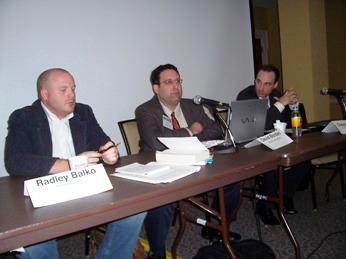
police militarization panel, featuring Reason's Radley Balko, StoptheDrugWar.org executive director David Borden, SWAT raid victim Mayor Cheye Calvo of Berwyn Heights, Maryland, moderated by Alison Grimmer of Roosevelt University SSDP
But Piper was also looking just a bit further down the road then next year's Congress. The
Office of National Drug Control Policy (ONDCP -- the drug czar's office) comes up for reauthorization in 2010, he noted. Rather than try futilely to eliminate the office, "we can try to shift ONDCP's goals" to a more public health-oriented approach, he suggested.
"Marijuana is more popular than the past three presidents," MPP executive director Rob Kampia told a cheering audience as he recounted this year's victories for medical marijuana in Michigan and decriminalization in Massachusetts.
Student activists took no back seat to the professionals, though, and the breadth of reform efforts by SSDP chapters, and number of campuses leading or helping with them was impressive. Conference-goers got to hear about campus campaigns ranging from establishing safe ride programs (reducing intoxicated driving without exposing students to threat of penalty); good Samaritan overdose policies (neither the student needing medical help nor the student reporting it facing threat of arrest); getting schools to stop calling police into dorms for drug infractions; reforming dorm eviction policies for substance violations; working with ballot initiative campaigns such as those in Michigan and Berkeley; public education efforts; and state lobbying campaign; among others.
One chapter, Kalamazoo College in Michigan, seemed to have done almost everything, and all during its first year. At the annual Awards Banquet, where representatives received the Outstanding Chapter Award, a raft of impressive achievements were listed off in the introduction. Not only did Kalamazoo SSDP get a safe ride program established, and Good Samaritan and not calling police into dorms for minor drug violation policies established. They also went outside the campus to bring together a coalition of community groups, government agencies and law enforcement to get approval for a needle exchange program in the city for the first time.
One highlight of the conference was the Saturday lunch debate between SSDP executive director Kris Krane and Kevin Sabet of Students Taking Action Not Drugs. The back and forth between the two, moderated by Washington Post columnist Courtland Milloy, kept the audience rapt -- and scoring the debate like a boxing match.
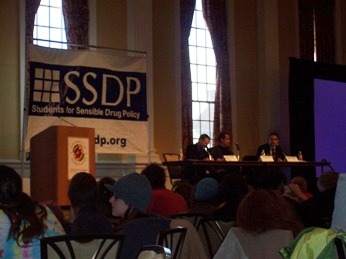
Krane/Sabet debate, Washington Post's Courtland Milloy moderating
Sabet, in what must have felt like hostile territory, did his best to try to establish "common ground" with drug reformers, citing his support for addressing the crack/powder disparity and qualifying some of drug czar John Walters' policies as "stupid politics." He also cited as models programs like North Carolina's Project HOPE, where probationers and parolees confronted by positive drug tests are not sent back to prison, but are hit with quick, short jail stays. "That's a huge motivation," Sabet argued.
If Sabet was looking for agreement from Krane or the audience, he didn't find much of it. "Our metrics in the war on drugs are wrong," said Krane. "We should be measuring abuse, problem use, infection rates -- not drug use rates," he argued. "You have to get arrested to get treatment, and that's backwards," he said.
Instead of being based on the Holy Grail of reducing drug use, drug policy should have different guiding principles, Krane argued. "First, no one should be punished for using drugs absent harm to others. Second, we should adopt a harm reduction framework, and third, we should adopt a human rights framework."
"Drug use doesn't occur in a vacuum," Sabet retorted. "A lot of drug use is problematic, and some of that can be addressed by dealing with poverty, health care, and homelessness. There is common ground," he tried again.
Not so quick, Krane replied, arguing that drug use should be treated as a public health problem, not the purview of law enforcement.
"Drug trafficking is not a public health problem, it's a law enforcement problem," Sabet countered.
"Drug trafficking is a prohibition problem, not a law enforcement problem," Krane retorted to cheers from the crowd.
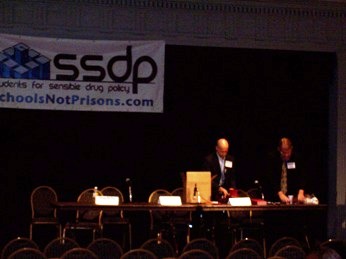
David Guard and Pete Guither prepare for ''Elevator Arguments'' panel
After the spirited back and forth between Sabet and Krane, attendees were treated to an address by Rep. Danny Davis (D-IL), who zeroed in on racial disparities in drug law enforcement. "One of the most egregious aspects of our drug policy is the racial inequity," he said, reeling off the now familiar statistics about African-Americans sucked into the drug war incarceration machine and urging support for re-entry and rehabilitation efforts for prisoners. "If we can reduce crime and recidivism, if we can help these prisoners, if we can train and educate them, we are helping all of America," Davis said.
Davis, too, pronounced himself optimistic. "There is a sense of hope that we can develop a sane policy in the way we treat drugs," he told the students, "but you have to stay engaged and involved. You have to believe change is not only possible, it's inevitable."
If Saturday was a day of panelists and speechifying, Sunday was for getting down to nuts and bolts as the young activists attended a plethora of sessions hosted by more experienced veterans. Students heard presentations on best practices for chapter organizing, fundraising, making quick reform arguments, networking, working the media, and working with youth communities, and looking beyond campus reform, among others. And the lunch session was a working one, with activists dividing up geographically and deciding on locations for regional conferences to be held in the spring.
From its beginning with a handful of students in the Northeast in 1998 outraged by the Higher Education Act's drug provision, SSDP has grown to an international organization with 140 campus chapters in the US, as well as Canada, the United Kingdom and Nigeria. With all they learned at this year's conference, the newest generation of drug reform activists is now headed back home to spread the message and the movement to the next generation.
Visit the Drug WarRant blog for Pete Guither's seven-part series of live-written reports from the conference.
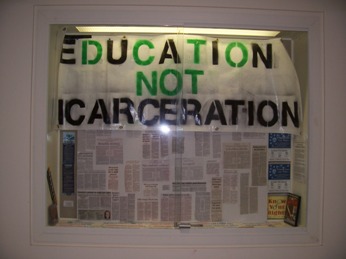
UMD SSDP window, Stamp Student Center
back to top
Immortalized by the hit HBO series "The Wire," Baltimore's Eastern District is one tough neighborhood in one of the country's toughest towns. With some 45,000 residents, almost entirely black, it generates 20,000 arrests a year, the vast majority of them drug-related. It's a tough, gritty neighborhood with widespread poverty, open-air drug markets, a healthy heroin (or "hair-on" in Eastern District-speak) habit, and all the attendant problems associated with those ills.
For a bit more than a year, the Eastern District was
Peter Moskos' beat. The Harvard educated sociologist (now on the faculty of City University of New York's John Jay College of Criminal Justice) with an interest in police socialization joined the Baltimore Police Department to become a "participant-observer" on the sociology of policing in that department, enabling him to achieve a degree of intimacy with his fellow officers rarely achieved by outside academics.
For Moskos, and for his readers, his sojourn on the mean streets has paid off handsomely. Moskos got a book deal (and presumably a dissertation) out of his experiences, and we readers get a real treat. The uniformed Moskos -- he served exclusively as a beat officer -- was able to win the trust and fellowship of his colleagues, and in so doing, he was able to open a window on what it is like to be a police officer in the drug war.
I would imagine that most Drug War Chronicle readers -- LEAP members excluded -- have little knowledge of or empathy for the men in blue. The cops, after all, are the front line in the drug war. And, as Moskos reports, drawing on extensive notes, the drug dealers and users of the Eastern District are relatively easy pickings for police officers looking to generate arrest statistics.
"In high drug areas, there is no shortage of drug offenders to arrest," he writes. "The decision to arrest or not arrest becomes more a matter of personal choice and police officer discretion than of any formalized police response toward crime or public safety."
Not only do police routinely arrest suspect Eastern District residents -- for loitering, if nothing else -- they almost universal despise them and their drug habits. Moskos really shines at getting his comrades to speak openly and honestly about their attitudes, and in that sense, "Cop in the Hood" is as revelatory as it is sometimes disturbing. Such attitudes may be deplorable, but they are also understandable. When all you see is the worst of humanity, it's easy to get alienated. As one officer put it, "You don't get 911 calls to tell you how well things are going."
But not all beat officers are eager to arrest drug offenders. As Moskos details, the cops get frustrated by the revolving-door that sees drug offenders sent to county jail on arrest only to be spit out a few hours later or to have drug dealing charges reduced to simple possession because prisons are packed and prosecutors overworked. (Moskos observes that the drug war would grind to a halt if drug offenders uniformly demanded jury trials. Now, there's a reason to unionize drug users!)
Police officers don't want to be social workers, Moskos reports, and they are not interested in the root causes of drug use and attendant social ills. What they are interested in is doing their job with a minimum of hassle (from the streets or their superiors), returning home safely each night, and retiring with a nice pension. That means that for many officers, high drug arrest numbers early in their careers will drop off over time as they confront a combination of a sense of futility, overtime, and paperwork. As one officer put it:
You'll get out there thinking you can make a difference. Then you get frustrated: a dealer caught with less than 25 pieces will be considered personal use... Or you go to court and they take his word over yours. You're a cop and you're saying you saw something!... After it happens to you, you don't care. It's your job to bring him there [to court]. What happens after that is their problem. You can't take this job personal. Drugs were here before you were, and they'll be here long after you're gone. Don't think you can change that. I don't want you leaving here thinking everybody living in this neighborhood is bad, does drugs. Many cops start beating people, thinking they deserve it.
While Moskos by no means sugarcoats the behavior or attitudes of his coworkers, his reporting will undoubtedly help readers attain some understanding of how they got that way. "Cops in the Hood" is also useful for understanding the bureaucratic grinder facing police officers in large urban departments, where they are caught between pressures from above for more arrests, from Internal Affairs to do it by the book, from the neighborhoods to clean out the riff-raff and from the same neighborhoods to respect the civil rights of residents.
Moskos brings the added advantage of not writing like an academic. "Cops in the Hood" is engaging, even riveting, and makes its points straightforwardly. Yes, Moskos references policing theory, but he does so in ways that make it provocative instead of off-putting.
He also includes a well-researched and -written chapter on the evils of prohibition -- it's subtitled "Al Capone's Revenge" -- but in this case, it's hardly necessary. Like a good student listening to his English composition instructor, Moskos has shown us and he really doesn't need to tell us. Still, it is a strong chapter.
Moskos writes about his experience as a beat officer. That's a different animal from the largely self-selected group of police cowboys who end up in drug squads and SWAT teams. I have less sympathy for them, but that's another book, not this one.
People interested in the nitty-gritty of street-level drug law enforcement need to read this book. Criminal justice students and anyone thinking about becoming a police officer need to read this book, too. And the politicians who pass the laws police have to enforce (or not), need to read this book as well, although they probably won't.
back to top
Earlier this month we wrote seeking support for StoptheDrugWar.org (DRCNet)'s lobbying programs, to help us lobby the Obama administration and Congress on causes near and dear to the hearts of drug reformers with which the President-Elect has said he agrees.
This week we are seeking tax deductible donations to our educational programs, especially our web site, on which readership continues to go up and up.
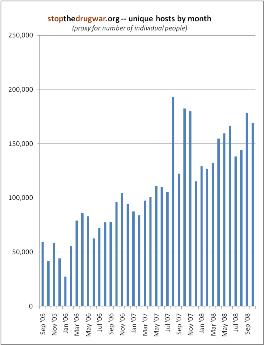 StoptheDrugWar.org web site traffic has grown at 60% per year for the past two years, as the chart to the left shows, bringing our average number of visitors to more than 150,000 per month. Over two hundred thousand people are verified to have read election-related drug policy coverage on our web site since the primaries began in earnest last year, and that doesn't include the most numerous number of our readers, those who read the content on our daily blog on our home page. More than 100,000 people visited StoptheDrugWar.org between November 1 and November 15!
StoptheDrugWar.org web site traffic has grown at 60% per year for the past two years, as the chart to the left shows, bringing our average number of visitors to more than 150,000 per month. Over two hundred thousand people are verified to have read election-related drug policy coverage on our web site since the primaries began in earnest last year, and that doesn't include the most numerous number of our readers, those who read the content on our daily blog on our home page. More than 100,000 people visited StoptheDrugWar.org between November 1 and November 15!
|
notepad folder:

one book we offer:
 |
As our thanks for your support, we continue to offer a wide range of books, videos and StoptheDrugWar.org gift items to members donating over certain levels --
visit our donation page to read the full list. Also, everyone donating this week will receive a complimentary StoptheDrugWar.org "Truth Campaign" notepad folder, and all donors will receive a StoptheDrugWar.org bumper sticker and a square StoptheDrugWar.org stop sign sticker, both being reprinted this month.
Drug policy reform is such an important issue, but it's an important issue that needs your help. We at StoptheDrugWar.org need you to ensure that this time of change, will bring needed change, for a disadvantaged, demonized and under-represented group in our society, the targets of the brutal War on Drugs. Please donate today, and together we will make things happen.
Thank you very much for working to change this country's drug policies and for continuing to be part of StoptheDrugWar.org. And thank you for giving your support to our efforts at this important hour. Your contribution has never been more important.

David Borden
Executive Director, StoptheDrugWar.org (DRCNet)
News & Activism Promoting Sensible Reform
P.S. Every day that goes by, 4,000 people are arrested for drug offenses, the vast majority of them minor, and half a million nonviolent drug offenders languish yet another day in the staggering number of prisons and jails the government has very unwisely built. It's time to stop this senseless tragedy and shocking injustice. Please increase your commitment to ending the drug war by donating to StoptheDrugWar.org today. Thank you!
back to top
An Indiana prosecutor gets slapped again over shady asset forfeiture practices, a Texas trooper gets caught with the coke, and so does a North Carolina cop. Let's get to it:
In Muncie, Indiana, the Delaware County prosecutor has been ordered to repay $18,395 in legal fees he paid himself as a drug task force prosecutor where he bypassed the courts and used confidential agreements with defendants to seize money and property. Delaware County Judge Richard Dailey ruled that because no asset forfeiture judgment was rendered in court, Prosecutor Mark McKinney is not entitled to attorney's fees. In one case cited where more than $50,000 was seized by the Muncie-Delaware County Drug Task Force, McKinney paid himself $4,193 in legal fees and took 25% of the value of seized property auctioned off. He faces an investigation by a special prosecutor to see if he committed any crime with his handling of drug forfeitures, as well as a misconduct complaint filed with the Indiana Supreme Court disciplinary commission.
In Brownsville, Texas, a Texas Department of Public Safety trooper was charged Monday with possession with the intent to distribute cocaine after police watched him take delivery of two suitcases full of the drug in a motel parking lot. Trooper Jesus Larrazolo, 35, was holding 26 kilos of coke when arrested by Brownsville police and agents from the FBI's Special Investigations Unit. According to court documents, Larrazolo said he had been threatened by unknown persons if he did not participate in the drug deal. He is a six-year veteran trooper.
In Columbus, North Carolina, a former Columbus police officer was arrested last Friday on multiple drug charges. Carl David Wright, 53, faces six counts each of trafficking cocaine by possession, transportation, and manufacture. During a search of Wright's home after his arrest, police seized more than $250,000 cash and a kilo of cocaine. State and federal revenue agents seized $4,000 in cash, $1,400 in coins, three flat-screen TVs, two lawn mowers, a 2002 Chevy Camaro and a 1997 Nissan pickup to help satisfy a $39,000 tax lien Wright was assessed for possessing the cocaine. Wright is being held at the Columbus County Detention Center with bail set at $1 million. The state charges could be superseded by federal charges if a grand jury that was set to meet this week returns a federal indictment against him.
back to top
The US Justice Department announced Tuesday that President Bush Monday had commuted the sentences of two people imprisoned for cocaine trafficking, including rapper and former Fugees producer John Forte, and pardoned 12 others, including three more people who had been convicted of drug-related offenses.
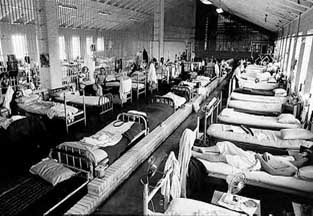
many more pardons are needed
Pardons are typically granted to persons convicted of a crime who have served their sentences -- the Justice Department recommends waiting five years after that to apply for a pardon -- while commutations typically cut the sentences of those still imprisoned, usually to time served, or in this case December 22.
Presidents typically issue pardons at year's end and especially at term's end, but President Bush has been comparatively stingy. So far, he has granted a total of 171 pardons and eight commutations. That's less than half as many as either President Clinton or President Reagan during their two terms. Perhaps it's a case of like father, like son: President George Herbert Walker Bush pardoned only 74 people during his four years in office.
Those pardoned for drug-related offenses were:
- Andrew Foster Harley, Falls Church, Virginia.
Offense: Wrongful use and distribution of marijuana and cocaine, Article 112a, Uniform Code of Military Justice.
Sentence: April 17, 1985, as approved June 13, 1985; US Air Force general court martial convened at the US Air Force Academy, Colorado Springs, Colorado; 90 days' confinement, forfeiture of all pay and allowances and dismissal from the Air Force.
- Robert Earl Mohon Jr., Grant, Alabama.
Offense: Conspiracy to distribute marijuana; 21 U.S.C. §§ 841 and 846.
Sentence: Oct. 22, 1987; Northern District of Alabama; three years in prison.
- Ronald Alan Mohrhoff, Los Angeles
Offense: Unlawful use of a telephone in furtherance of a narcotics felony, 21 U.S.C. § 843(b); possession of cocaine, 21 U.S.C. § 844(a).
Sentence: Oct. 9, 1984; Central District of California; one year of in prison followed by five years' probation with the special condition of 2,500 hours of community service.
Those whose sentences were commuted:
- John Edward Forte, North Brunswick, New Jersey
Offense: Aiding and abetting possession with intent to distribute five kilograms or more of cocaine; 21 U.S.C. §§ 841(a)(1) and 841(b)(1)(A)(ii), 18 U.S.C. § 2.
Sentence: Nov. 20, 2001; Southern District of Texas; 168 months in prison, five years' supervised release and a $5,000 fine.
Terms of commutation: Sentence of imprisonment to expire on Dec. 22, 2008, leaving intact and in effect the five year term of supervised release with all its conditions.
- James Russell Harris, Detroit, Michigan.
Offense: Conspiracy to aid and abet the distribution of cocaine, 21 U.S.C. § 846; attempted money laundering, 18 U.S.C. §§ 1956(a)(3) and 2; aiding and abetting the attempted distribution of cocaine, 21 U.S.C. § 841(a)(1); conspiracy to affect interstate commerce by obtaining property under color of official right, 18 U.S.C. § 1951; attempt to affect interstate commerce by obtaining property under color of official right, 18 U.S.C. § 1951.
Sentence: May 10, 1993; Eastern District of Michigan; 360 months in prison, five years' supervised release and a $50,000 fine.
Terms of clemency grant: Unpaid balance of fine remitted; sentence of imprisonment commuted to expire on Dec. 22, 2008, leaving intact and in effect the five year term of supervised release with all its conditions save the obligation to satisfy the unpaid balance of the fine.
Forte is the only one with a public profile. He co-wrote and produced two songs on the Fugees 1996 Grammy Award winner "The Score," and released two rap albums himself, including one with a track featuring a duet with Carly Simon. Forte got busted flying into Newark International Airport with 31 pounds of liquid cocaine in 2000.
Julie Stewart, president and founder of Families Against Mandatory Minimums, told the Associated Press she applauded Bush's decision to commute the sentences. She told the AP sentences for many "low-level, first-time, nonviolent drug offenders" don't fit the crime.
According to the latest statistics from the federal Bureau of Prisons, there are currently more than 98,000 people doing time for drug offenses in the federal system.
back to top
In a narrow interpretation of the state's Compassionate Use Act, the California Supreme Court ruled Monday that people who supply medical marijuana to an approved patient can be prosecuted as drug traffickers if they don't meet the court's standards for caregivers. That standard must involve more than merely supplying medical marijuana to a qualifying patient, the court held.
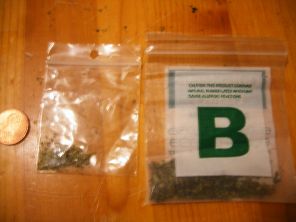
California medical marijuana bags (courtesy Daniel Argo via Wikimedia)
Prior to Monday's ruling, marijuana growers who had been designated as caregivers by multiple patients had been able to win protection from prosecution under the Compassionate Use Act. Now, patients who relied on such growers to provide their medicine will have to turn to dispensaries that are organized as co-ops or collectives in accordance with California law.
The ruling came in the case of California v. Mentch. Roger Mentch was arrested in 2003 after a bank teller smelled marijuana on repeated cash deposits he made and police subsequently searched his home, where they found nearly 200 pot plants growing. Mentch told investigators he was the "primary caregiver" for five qualified patients, but at trial, the judge refused to let the jury consider whether he was a caregiver, and Mentch was convicted and sentenced to probation. An appeals court in San Jose overturned his conviction, saying jurors should have been allowed to decide whether he was indeed the patients' caregiver, but now the state's high court has disagreed.
"We hold that a defendant whose caregiving consisted principally of supplying marijuana and instructing on its use, and who otherwise only sporadically took some patients to medical appointments, cannot qualify as a primary caregiver under the Act and was not entitled to an instruction on the primary caregiver affirmative defense," wrote Justice Werdegar for the court. "We further conclude that nothing in the Legislature's subsequent 2003 Medical Marijuana Program (Health & Saf. Code, §11362.7 et seq.) alters this conclusion or offers any additional defense on this record."
The language of Proposition 215 defines a primary caregiver as "the individual designated by the [patient]... who has consistently assumed responsibility for the housing, health, or safety of that person." With this ruling, the state Supreme Court has defined that definition to "imply a caretaking relationship directed at the core survival needs of a seriously ill patient, not just one single pharmaceutical need."
Thus, for someone to be able to assert a caregiver defense to a marijuana cultivation or distribution charge, he "must prove at a minimum that he or she (1) consistently provided caregiving, (2) independent of any assistance in taking medical marijuana, (3) at or before the time he or she assumed responsibility for assisting with medical marijuana."
"Ideally, it won't have a tremendous effect," Joseph Elford, attorney for the medical marijuana advocacy group Americans for Safe Access told the San Francisco Chronicle. "Patients will now increasingly get their medication through collectives and cooperatives."
The 2003 law establishing the dispensary system "provides an alternative outlet for patients," agreed Deputy Attorney General Michele Swanson, the state's lawyer.
But Mentch attorney Lawrence Gibbs told the Chronicle the court's decision "made it much, much more difficult" for qualified patients to get their medical marijuana. While the ruling may not have a significant impact on access to medical marijuana in areas where dispensaries are plentiful, large swathes of the state have no dispensaries. In those areas, patients will have to grow for themselves, have a spouse, domestic partner, or family member who can meet the court's definition grow it for them, travel long distances to areas where there are dispensaries, or resort to the black market.
back to top
Under existing Dutch policy, licensed marijuana coffee shops can sell their wares to consumers, but have no legal means of obtaining those wares. That snag in the cannabis supply system is known as the "backdoor problem:" Marijuana can legally exit the coffee houses via the front door, but must enter illegally through the backdoor. The backdoor problem has existed for years, but now things seem to be coming to a head.

downstairs of a coffee shop, Maastricht (courtesy Wikimedia)
Dutch mayors meeting at a weekend "Cannabis Summit" are seeking to solve the backdoor problem, as well as address the conservative governing coalition's efforts to restrict or even shut down the famous coffee houses. The number of coffee shops has dwindled slowly but steadily under the conservative government, with more slated to be forced to close in the next two years. On Saturday, the leader of the governing Christian Democratic Party, Pieter van Geel, said all the coffee shops should be closed.
The summit was called by Maastricht Lord Mayor Gerd Leers last week after the city councils of Roosendaal and Bergen op Zoom decided to shut down all the coffee shops because of problems associated with masses of pot-buying visitors from neighboring Belgium, France, and Germany, which lack regulated marijuana sales.
More than three-quarters of the 40 mayors in attendance agreed that marijuana should be grown under license for wholesale purchase by the coffee houses and, ultimately, retail sale to consumers. But while there is broad agreement on licensing grows, just how they would come about remains a matter of contention.
According to Dutch News, Eindhoven Mayor Rob van Gijzel and his city council are prepared to operate their own grow as a "monitored pilot scheme" to see if licensed growing reduces drug-related crime. The Tilburg city council said it wanted to start a "cannabis market garden" to supply local shops.
But Amsterdam Lord Mayor Job Cohen told London's Telegraph newspaper that while he was in "full support" of the coffee shop system, Eindhoven's plan to involve the city council in marijuana growing was going "a little too far." Instead, he said he would prefer to see licensed private growers closely monitored by the police.
"While I don't agree with the idea of councilors actually growing cannabis in plots near their town halls, a positive development has been that our government has now said it will take a close look at the issue of where the cannabis should come from. We could see the problem of the two doors -- legal front door for customers, illegal back door for supplies -- being resolved soon."
In fact, said Cohen, the entire trade should just be legalized. "Look what happened during prohibition years in America and how criminals took over and look at Belgium, France and Britain where soft drugs are not legal but are available and are a part of the criminal world," he said. "We can't avoid them, so it is better to legalize them to keep them under control."
On Sunday, Health Minister Ab Klink somewhat surprisingly said that while the licensed grow plan in Eindhoven would conflict with the policy of the conservative ruling coalition, he was prepared to look closely at the plan and discuss it with the rest of the cabinet. While the Christian Democrats and Christian Unity parties are opposed to legal production for the coffee shops, the coalition's Labor Party has called for parliamentary debate on the issue.
The forces of drug reform are mobilizing, too. The Netherlands Drug Policy Foundation, the European umbrella reform group ENCOD, and Amsterdam's Cannabis College have organized the first Netherlands Cannabis Tribunal in the Hague on Monday and Tuesday. A centerpiece event should be the planned debate between Christian Democratic Party spokesperson Cisca Joldersma, and Hans van Duijn, LEAP (Law Enforcement Against Prohibition} member and former president of the Dutch Police Association.
back to top
November 28, 1993: Reuters reports that Colombia's prosecutor general Gustavo de Greiff said the war on drugs has failed and Colombia should legalize cocaine and marijuana trafficking because the United States and Europe are decriminalizing consumption.
December 2, 1993: Notorious drug lord Pablo Escobar is hunted down and killed by Colombian police making use of US technology. At his funeral days later, tens of thousands of Medellin residents come out to mourn him.
December 3, 1998: Colombian police seize about seven tons of cocaine in Cartagena, Colombia, destined for the US via Cuba.
November 30, 2000: The DEA announces that it intends to prohibit hemp products, including shampoo, soap, and food made from non-psychoactive hemp seeds. (DEA loses this one.)
December 1, 2000: President of Uruguay Jorge Batlle is quoted in El Observador suggesting legalization of drugs.
November 30, 2001: The Austin Chronicle calls John Walters, the new US drug czar, "the Dr. Strangelove of our country's absurd drug war -- he dismisses anyone who says our nation's prisons are too full, he favors longer jail sentences for marijuana users, he has declared that there's too much 'treatment capacity' in the US, he opposes efforts to address the racial discrepancies in drug enforcement, he wants more militarization of the drug war at home and abroad, he'd like to see an expansion of our government's war in Colombia, and he's been a noisy opponent of state initiatives to allow the medical use of marijuana."
December 4, 2001: Canada's Auditor General releases a report on the federal government's role in dealing with illicit drugs. Part of the report reads: "Eleven federal departments and agencies are involved in the effort to control illicit drugs at a cost of about $500 million a year... But they don't know the extent of the problem and whether or not they are succeeding in their efforts."
December 2, 2002: Reuters reports that an independent study concluded marijuana use does not lead teenagers to experiment with hard drugs like heroin or cocaine. The study by the private, nonprofit RAND Drug Policy Research Center countered the theory that marijuana acts as a so-called gateway drug to more harmful narcotics, a key argument prohibitionists use against legalizing marijuana in the United States.
November 29, 2004: In the US Supreme Court, oral arguments are heard in the Gonzales v. Raich medical marijuana case.
back to top






